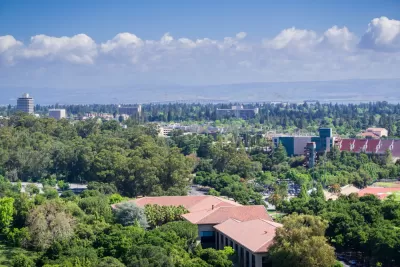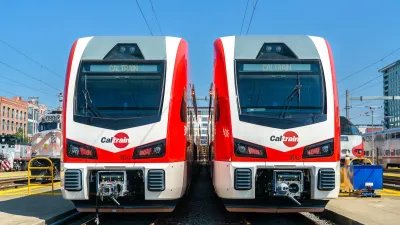A $1.1 billion donation to Stanford seeks to mitigate climate change. As impressive as that gesture is, the real solutions to climate change lie in hearts and minds around the world—and not in Palo Alto, California.

“I don’t doubt that an institution like Stanford will produce important work with those funds. And yet, the idea of fighting climate change by cloistering it in an ultra-exclusive institution, in a region that is already well versed in the ravages of climate chance, seems to miss the mark.”
“Dating back to the days of 'An Inconvenient Truth,' the state adopted a raft of laws and regulations designed to promote dense development. They include AB 32 (greenhouse gas reduction), SB 375, (dense development and coordination between land use and transportation), SB 743 (reducing vehicle miles traveled), and others—all of which take aim, in some way or another—at the carbon-intensive landscape that California built in the 20th century and on the types of fuels we use.”
“Despite having a darn good model of dense urbanism at the northern end of the San Francisco Peninsula, the cities of the South Bay exemplify what not to do. They rely on freeways and wide boulevards. They celebrate single-family homes and denigrate density. They price out almost all workers below executive level, forcing them to drive in or take infamous 'Google Buses' and the like. For people who deal in futuristic nano-scale technology, the carbon footprint of the typical Silicon Valleyite is more like that of a brontosaurus.”
FULL STORY: An Ivory Tower Solution To Climate Change

Alabama: Trump Terminates Settlements for Black Communities Harmed By Raw Sewage
Trump deemed the landmark civil rights agreement “illegal DEI and environmental justice policy.”

Study: Maui’s Plan to Convert Vacation Rentals to Long-Term Housing Could Cause Nearly $1 Billion Economic Loss
The plan would reduce visitor accommodation by 25% resulting in 1,900 jobs lost.

Why Should We Subsidize Public Transportation?
Many public transit agencies face financial stress due to rising costs, declining fare revenue, and declining subsidies. Transit advocates must provide a strong business case for increasing public transit funding.

Wind Energy on the Rise Despite Federal Policy Reversal
The Trump administration is revoking federal support for renewable energy, but demand for new projects continues unabated.

Passengers Flock to Caltrain After Electrification
The new electric trains are running faster and more reliably, leading to strong ridership growth on the Bay Area rail system.

Texas Churches Rally Behind ‘Yes in God’s Back Yard’ Legislation
Religious leaders want the state to reduce zoning regulations to streamline leasing church-owned land to housing developers.
Urban Design for Planners 1: Software Tools
This six-course series explores essential urban design concepts using open source software and equips planners with the tools they need to participate fully in the urban design process.
Planning for Universal Design
Learn the tools for implementing Universal Design in planning regulations.
Caltrans
Smith Gee Studio
Institute for Housing and Urban Development Studies (IHS)
City of Grandview
Harvard GSD Executive Education
Toledo-Lucas County Plan Commissions
Salt Lake City
NYU Wagner Graduate School of Public Service




























